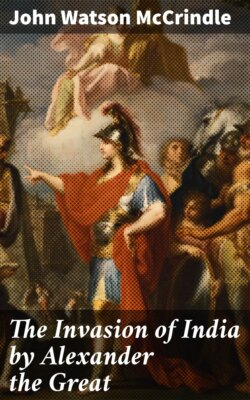Читать книгу The Invasion of India by Alexander the Great - John Watson McCrindle - Страница 9
На сайте Литреса книга снята с продажи.
Plutarch
ОглавлениеTable of Contents
There are but few works in the wide circle of literature which have afforded so much instruction and entertainment to the world as Plutarch’s Parallel Lives of the Famous Men of Greece and Rome. These Lives, which are forty-six in number, are arranged in pairs, and each pair contains the life of a Greek and a Roman, followed, though not always, by a comparison drawn between the two. Alexander the Great and Caesar are ranked together, but no comparison follows. In his introduction to the life of the former, Plutarch explains his method as a biographer. “We do not,” he says, “give the actions in full detail and with a scrupulous exactness, but rather in a short summary, since we are not writing histories, but lives. It is not always in the most distinguished achievements that men’s vices or virtues may be best discerned, but often an action of but little note—a short saying or a jest—may mark a person’s real character more than the greatest sieges or the most important battles.” His Lives, therefore, while useful to the writer of history, must be used with care, since they are not intended as materials for history. His narrative of Alexander’s progress through India has one or two passages which show this indifference to historical accuracy, as when, for instance, he states that the soldiers of Alexander refused to pass the Ganges when they saw the opposite bank covered with the army of the King of the Praisians.[6] His account of the battle with Pôros is, however, excellent, and all the more interesting, because, as he tells us, he obtained the particulars from Alexander’s own letters.[7]
Plutarch was a native of Chairôneia, a town in Boiôtia. The date of his birth is unknown, but may be fixed towards the middle of the first century of our aera. He visited Italy, and lectured on philosophy in some of its cities. For some time he lived in Rome, where, it is said, but on doubtful authority, that he was promoted to high offices of state, and became tutor to the Emperor Trajan. The later years of his life he spent at Chairôneia, where he discharged various magisterial offices and held a priesthood. The date of his death, like that of his birth, is unknown, but it is clear that he lived to an advanced age. Besides the Lives, he published other writings, mostly essays, having some resemblance to those of Bacon. They are sixty in number, and are called collectively Moralia, though some of them are of an historical character. Two of them are orations About the Fortune or Virtue of Alexander. His style is somewhat difficult, at times cumbrous and involved, and somewhat deficient in that grace and perspicuity for which the works of the Attic writers are noted. His writings are all the more valuable from their supplying a deficiency of the Greek historians, whose works are filled with the records of war and politics, while giving us but little insight into men’s private lives and their social surroundings.
